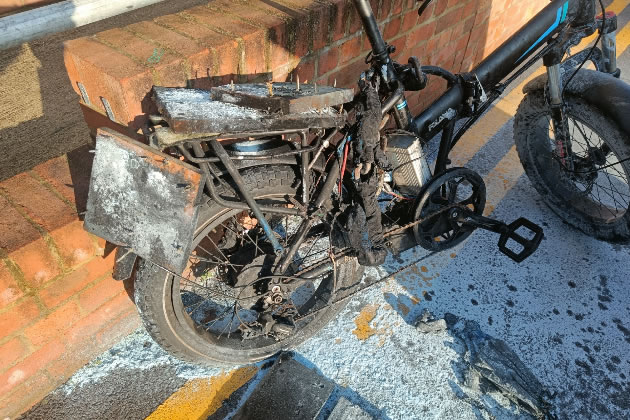Fire Brigade Issues Renewed Warning Over e-bike Fires
Called out to over one hundred incidents so far this year

A burnt out e-bike. Picture: London Fire Brigade
September 1, 2023
Fires caused by e-bikes and e-scooters have already reached a record high in the capital this year, the London Fire Brigade (LFB) has warned.
So far in 2023, crews have already fought 104 e-bike fires along with 19 e-scooter blazes, overtaking the 116 total fires attended in the whole of last year, and higher than any other year in London.
Three people have been killed – in Southwark, Shadwell, and Kentish Town – and 51 injured in these fires this year, the LFB said, as they called for improved regulation to boost safety standards.
The brigade warned in particular of e-bikes or e-scooters that have been fitted with batteries or other parts purchased separately online, especially if they are not bought from a reputable seller.
The fires are caused when the vehicles’ lithium batteries become damaged or fail.
Dom Ellis, the LFB’S deputy commissioner, said, “We recognise the environmental benefits they bring to travel in our city, but the stark reality is that some of these vehicles are proving to be incredibly dangerous, particularly if they have been modified with second-hand products or if batteries are used with the wrong chargers.
“Without urgent research into the causes of these battery fires and proper regulation that will help prevent people unknowingly purchasing dangerous products from online marketplaces, such as batteries and conversion kits, we fear we will continue seeing a high level of these types of fires in London.”
The most recent incident saw a man taken to hospital suffering from burns after an e-bike fire in Brixton.
In New York, the City Council is set to introduce new laws prohibiting the sale, lease, or rental of e-bikes, e-scooters, and storage batteries, that fail to meet recognised safety standards after four people died this June after a fire broke out in an e-bike shop.
In an analysis of the 73 e-bike fires that occurred in the first six months of this year, LFB investigators found that at least 40 per cent are believed to involve a converted e-bike – that is a standard bike which has been electrically boosted using a so-called conversion kit.
At least 77 per cent are believed to have involved the failure of the bike’s battery and at least 41 per cent of the bikes are believed to have been on charge at the time of a fire starting.

Dom Ellis, the LFB’S deputy commissioner
The issue was discussed at a June meeting of the London Assembly’s fire, resilience and emergency planning committee, where members were told that gig economy workers, such as delivery riders, make up a large number of those affected by the blazes.
This is because they often buy cheap conversion kits online, and then leave their converted bikes charging overnight before going out on their next shift.
Offering his advice to Londoners, Mr Ellis said the vehicles should be stored outdoors if possible.
If that is not possible, he said: “Never store the vehicle by your front door, in a hallway, or on any escape route. We’ve seen the devastating consequences of what can happen when an exit is blocked by an e-bike fire.
“Instead, keep it in a room where you can shut a door, contain the fire and call 999.
“Never charge your e-bike or e-scooter whilst you are asleep and unplug the charger once the vehicle has finished charging. Please also make sure you are using the correct charger for the vehicle.”
Baroness Fiona Twycross, London’s deputy mayor for fire and resilience, said she is “continuing to call on the Government to introduce a regulatory framework which can help improve product safety, especially for lithium-ion batteries, and supporting the London Fire Brigade’s #Chargesafe campaign”.
A spokesperson for the Department for Business and Trade said, “We are consulting on modernising our product safety framework to hold online marketplaces to account, ensuring items sold online meet the same standards as on the high street.
“If businesses don’t comply with product safety regulations, the Office for Product Safety and Standards will take appropriate enforcement action such as ordering the removal of the product from the market.”
Noah Vickers - Local Democracy Reporter
Like Reading Articles Like This? Help Us Produce More This site remains committed to providing local community news and public interest journalism. Articles such as the one above are integral to what we do. We aim to feature as much as possible on local societies, charities based in the area, fundraising efforts by residents, community-based initiatives and even helping people find missing pets. We've always done that and won't be changing, in fact we'd like to do more. However, the readership that these stories generates is often below that needed to cover the cost of producing them. Our financial resources are limited and the local media environment is intensely competitive so there is a constraint on what we can do. We are therefore asking our readers to consider offering financial support to these efforts. Any money given will help support community and public interest news and the expansion of our coverage in this area. A suggested monthly payment is £8 but we would be grateful for any amount for instance if you think this site offers the equivalent value of a subscription to a daily printed newspaper you may wish to consider £20 per month. If neither of these amounts is suitable for you then contact info@neighbournet.com and we can set up an alternative. All payments are made through a secure web site. One-off donations are also appreciated. Choose The Amount You Wish To Contribute. If you do support us in this way we'd be interested to hear what kind of articles you would like to see more of on the site – send your suggestions to the editor. For businesses we offer the chance to be a corporate sponsor of community content on the site. For £30 plus VAT per month you will be the designated sponsor of at least one article a month with your logo appearing if supplied. If there is a specific community group or initiative you'd like to support we can make sure your sponsorship is featured on related content for a one off payment of £50 plus VAT. All payments are made through a secure web site. |